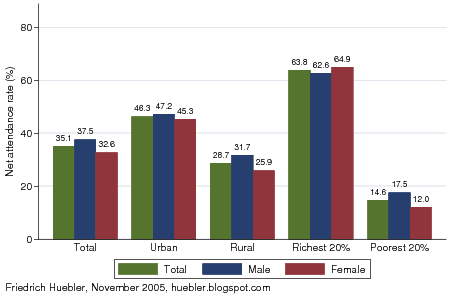Far fewer children continue their education at the secondary level. The official secondary school age in Nigeria is 12 to 17 years and 35.1% of the children in this age group were in secondary school according to the DHS. For boys the secondary school net attendance rate (NAR) was 37.5% and for girls it was 32.6%.
Secondary school net attendance rate, Nigeria 2003

Data source: Nigeria 2003 DHS.
The attendance rate is strongly linked to household wealth and area of residence. 63.8% of children from the richest 20% of all households were in secondary school, compared to only 14.6% of children from the poorest 20% of all households. The secondary school NAR in urban areas was 46.3% and in rural areas it was 28.7%.
At the country level, the secondary school NAR of girls was 4.9% below the male NAR. This gender disparity is a result of lower attendance rates among girls in rural areas and in poor households. In urban Nigeria, the difference between male and female attendance rates was 1.9% and the gender parity index (GPI, the ratio of female to male NAR) was close to 1, in rural Nigeria the difference was 5.8% and the GPI was 0.82. In the poorest households the gender gap was 5.5% but in the richest household the gap was reversed: the NAR of girls was 2.3% above the NAR of boys. To reach the Millennium Development Goal of gender parity, education policy has to target poor rural residents.
Secondary school net attendance rate, Nigeria 2003
| Total NAR (%) | Male NAR (%) | Female NAR (%) | Difference male- female | GPI female/ male | |
| Urban | 46.3 | 47.2 | 45.3 | 1.9 | 0.96 |
| Rural | 28.7 | 31.7 | 25.9 | 5.8 | 0.82 |
| Richest 20% | 63.8 | 62.6 | 64.9 | -2.3 | 1.04 |
| Poorest 20% | 14.6 | 17.5 | 12.0 | 5.5 | 0.69 |
| Total | 35.1 | 37.5 | 32.6 | 4.9 | 0.87 |
Related articles:
- Primary school attendance in Nigeria
- Age and level of education in Nigeria
- Household wealth and school attendance in Nigeria
Friedrich Huebler, 16 November 2005 (edited 21 January 2006), Creative Commons License
No comments:
Post a Comment